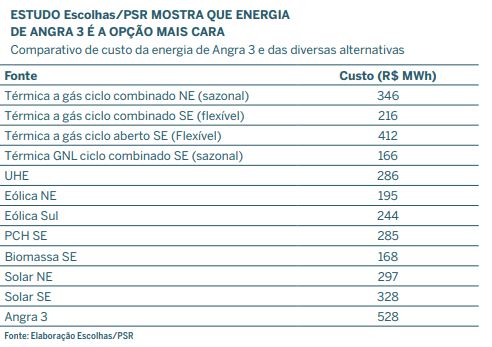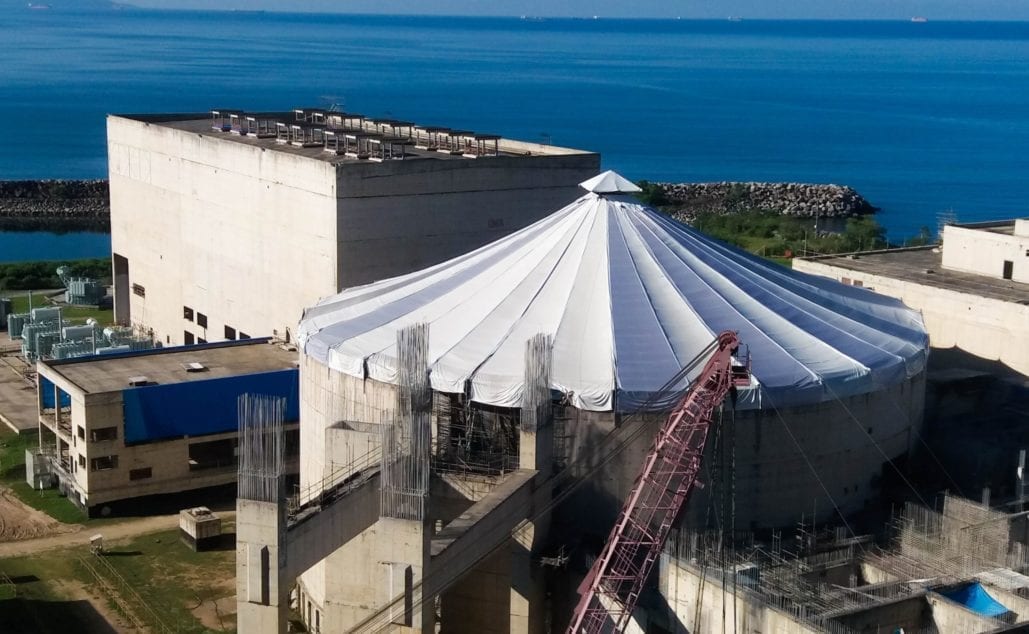The first Text for Discussion of Escolhas “Angra 3: does it worth the value it costs?” is theme of the interview, Sergio Leitão, Escolhas director, to Agência EPBr

The work released this Tuesday (05/19) presents numbers, data, and views of specialists and stakeholders that may contribute so that the Brazilian society decides of Angra 3 is the best option.
“If we finish it and put it to work [the plant of Angra 3], there will be a cost of R$ 12 billion more than if another source is chosen, which is the solar source. But, if we add that to the fact that there will be remaining energy, because the fall of our economy will be terrible, the question is why does the country have to put such cost in the budget of the electricity sector? Sergio Leitão questions in an interview to the reporter Guilherme Serodio.

Sergio Leitão, CEO of Instituto Escolhas (photo by Leonardo Rodrigues, January 2020)
Read the entire article:
Energy generated by Angra 3 may be 218% more expensive than the gas alternative, study by Instituto Escolhas concludes.
In an interview to epbr, the institute’s CEO, Sergio Leitão, questions of investment in nuclear power and in infrastructure to gas still make sense in Brazil
By Guilherme Serodio
May 19, 2020
In Gas market, Energy policy, Electricity sector, Energy transition
Sergio Leitão, CEO of Instituto Escolhas (photo by Leonardo Rodrigues, January 2020)
CEO of Instituto Escolhas, Sergio Leitão, defends that the investment in the completion of the works of Angra 3, which includes state resources, does not make sense upon cheaper and cleaner options. The organization is releasing a new study (.pdf) that challenges the benefits of the total investment estimated in R$ 25 billion to complete the nuclear plant designed to a power of 1,405 MW, under construction in Angra dos Reis (RJ), since early decade of 1980’s.
With the information from PSR, the document concludes that the energy of Angra 3 will be more expensive than the 12 alternatives of electric power generation analyzed. The nuclear plant would have a final cost of R$ 528 per MWh, even higher than the flexible open-cycle natural gas thermal power plants, less efficient. It is up to 144% more expensive than a combined-cycle natural gas thermal power plant (more efficient), generating at R$ 216 per MWh, and 218% more than a liquefied natural gas (LNG) unit, with cost calculated at R$ 166 per MWh. See summary in the chart
The energy of Angra 3 has a cost forecast by the government of R$ 480 per MWh, considering the total demand of investments of approximately R$ 25 billion, and the possibility of start-up in 2026 – planning that may be affected by the public health and economic crisis as a result of covid-19 pandemic. Data mentioned by Instituto Escolhas, based on the Federal Audit Court (TCU), Ministry of Mines and Energy (MME), Aneel, and Eletronuclear.
“If we finish it and put it to work [the plant of Angra 3], there will be a cost of R$ 12 billion more than if another source is chosen, which is the solar source. But, if we add that to the fact that there will be remaining energy, because the fall of our economy will be terrible, the question is why does the country have to put such cost in the budget of the electricity sector?”, Sergio Leitão questions.

Where: Escolhas/PS STUDY SHOWS THAT ENERGY FROM ANGRA 3 IS THE MOST EXPENSIVE OPTION
Comparison of cost of the energy from Angra 3 and of the several alternatives
Source: Escolhas/PSR Preparation
Excerpt of the study Angra 3: does it worth the value it costs?, prepared by Instituto Escolhas with consultancy of PSR
Eletronuclear estimates that R$ 14.5 billion will be required to complete Angra 3 and has a debt of R$ 19 billion related to the construction of the plant, the president of the state-owned company, Leonam Gumarães, informed this Monday (18), during a virtual event promoted by the Brazilian Association for the Development of Nuclear Activities (Abdan). Information from Valor Econômico.
The current schedule foresees the resumption of the works on October, 2021, but the business model prepared by BNDES to attract an international partner still needs to be approved by the Council of the Program of Investment Partnerships (CPPI). Stage was forecast to March, but it was postponed due to the pandemic.
“What is currently searched for is to advance in the civil works and electro-mechanic assembly with companies contracted by Eletronuclear and keeping the supplies considered critical, so that we make such work still this year, 2020, to effectively be able to sign the civil works and electro-mechanic assembly in early 2021, to effectively start the concreting and assembly on October, 2021, respecting the start-up on November, 2026”, the officer affirmed.
Investments in natural gas infrastructure could be used in the decarbonisation of the energy matrix
Sergio Leitão is critic to the strategy of investing in enhancing of the infrastructure for distribution, processing, and transportation of natural gas in Brazil. From the premise that the energy is cleaner than other fossil fuels, he questions if it would not be more advantageous to use the offer of imported liquefied natural gas (LNG).
“Since the gas is presented as a transition fuel, wouldn’t it be more interesting that one imported instead of constructed all such infrastructure? Wouldn’t it be better to invest in the decarbonisation of the energy matrix?”
Instituto Escolhas understands that it lacks transparency and dialog with the civil society regarding the energy planning of the country, with different governments imposing costly and anachronistic options when it comes to energy supply.
“We are losing the technology rush in the electricity sector. Brazil is a country that loves to be arrive late in the future, but now we are in need to make a leap in such sense, save conversation time to know where we want to arrive, and make the calculation of cost”.
Sergio Leitão is one of the founders of Instituto Escolhas, created in 2015.
The entire interview with Instituto Escolhas’ CEO, Sergio Leitão
What should be taken into account in the choices of investments in the energy matrix in the future?
We committed two sins in the discussion of the energy transition in Brazil: not to say when it started, and nor when it would end. Additionally, I do not know where the calculation of the value we will invest to make the gas structure in Brazil profitable was made.
Since the gas is presented as a transition fuel, wouldn’t it be more interesting that one imported instead of constructed all such infrastructure? Wouldn’t it be better to invest in the decarbonisation of the energy matrix?
Today, a lot is saying about gas as the transition fuel, but it is not said until when and how much such investment will cost. Do we have a calculation of how much it will cost to make the monetization of such gas?
If we increasingly have more new sources coming, such prices will depreciate. Even more in Brazil, where it is needed to start from zero. There is the risk of a strong technology turn to occur and such infrastructure to generate a huge loss.
Isn’t such discussion been made?
No. There is a deficit of discussion about the options. Brazil would need to deeply revise its energy planning. Now we enter a time of reduction of the economic activity with no clear perspectives about when we will leave it.
There will be lack of money. Only to make the assistance package of the crisis, all that was expected to save with the Social Security Reform has already gone. In the event of the matter of the electricity sector, the discussion is dramatic.
There was euphoria with th discussion about the new gas market, but the impression we had was that no one asked about such cost. And now it became dramatic and it is impossible not to look at it taking into account the depreciation of the oil price as we see today.
We are losing the technology rush in the electricity sector. Brazil is a country that loves to be arrive late in the future, but now we are in need to make a leap in such sense, save conversation time to know where we want to arrive, and make the calculation of cost.
Does Brazil have to complete the construction of Angra 3?
Today the cost to finish such work is the same of not to finish. But there is an aggravating factor: If we finish it and put it to work, there will be a cost of R$ 12 billion more than if another source is chosen, which is the solar source.
But, if we add that to the fact that there will be remaining energy, because the fall of our economy will be terrible, the question is why does the country have to put such cost in the budget of the electricity sector?
We are selecting to put a piece of such volume on the energy bill, encumbering the whole industrial sector that will leave such crisis extremely depleted. What is the sense of such option? It is not the electricity sector that would justify such expenditure.
There already is an indication that we will have room to spare in the energy supply at least until 2021. And Brazil will recover [from the pandemic of the new coronavirus] with a lot of need of even more optimizing its expenditures. If it will have to spend so much, does it make sense to select such source?
In the study, Instituto Escolhas charges the government to explain the reasons to resume the work of Angra 3. What would they be? Is there an ideological option here?
If we look at the emphasis of the last governments, Lula, Dilma, as well as the current government brought the resumption of Angra 3 to the center of the discussion again. It shows that there is a discussion base that needs to be faced. And those are governments, from the ideological point of view, like water and oil, which do not blend together.
But all the view that was built in Brazil about nuclear energy goes in the direction of point out that it is important to insert the country in the club of countries that rule such technology. But is the construction of nuclear plants the way it is enabled for now?
Professor José Goldemberg says that it is not the case anymore. But if the debate is relevant to have autonomy in such area, we go back to the question of where allocating the investment. [José Goldemberg is a physicist, senior professor of the Energy and Environment Institute of São Paulo University].
But does such choice have to be made only to please a sector lobby?
When the desires of each of the sectors involved in the debate are not made explicit, we end up not understanding the reason why decisions are made. From the point of view of the electricity sector, the resumption of Angra 3 is not a necessity anymore. It is exactly concerned with the dimension of the bill.
There is no request, unless specifically from the nuclear energy sector, about that. When looking at the debate in the beginning of Lula government, a lot of people defended the completion of the work. Today, we have the contrary, the price of other sources has dropped, and the nuclear source continued with a very high cost.
It is not an ideological question anymore, but a question of calculation of value, of price. Do we have R$ 12 billion to spend more in a source so that it provides the same energy that may be delivered by other sources? We believe that this discussion needs to be made in the budget debate.
Does it lack transparency or dialog with the civil society in the decision-making of the government about the energy sector?
Yes, there is a deficit of discussion of the electric sector and of the government with the society. And the Federal Audit Court [TCU] itself asks that. [TCU analyzes the possibility of resumption of the work of Angra 3 plant].

With construction started in 1981, Angra 3 nuclear plant had its works interrupted several times. Bolsonaro Government included the project in the Investment Partnerships Program (PPI) and intends to attract private investment, keeping Eletronuclear’s control
How to increase such dialog?
There is CNPE, which needs to be made dynamic. Today, the body is many times seen as an approver of decisions that have already been made by the summit of the government. There are the places to improve such debate. The problem is that they are not used as they should. The question is: why isn’t the debate made?
And what is the impact we will have for not making such debate?
Brazil takes the risk of having remaining energy, an economy into shreds, and the energy bill more expensive in the world because it is tied in such set of situations, of choices, which do not allow the reduction of the energy bill.
The government plans to construct 6 nuclear plants more until 2050 at a cost of R$ 30 billion. Is it a reliable forecast?
Considering the cost forecast to Angra 3, it is not reliable. Such plan is not configured as credible. A substantial part of such new plants would be in Northeast region, where there are two obstacles: a critical regional situation about th offer of water and cheaper options of energy by wind and solar sources.
Today there already is a strong dispute in the region involving the supply of water to agriculture and to the cities. The plants would add a third factor, making such account even more complicated.
There are those who defend the nuclear option to help in the compliance with the climate goals. Such debate occurs in Japan and Germany.
Such intention does not match the reality that the document itself we are releasing shows. Even in the USA and Europe, the number of stations under construction is very low.
Would adopting the option for the nuclear energy affect even more Brazil’s image in the international debate about environment and sustainability?
I believe that it would cause a very strong doubt if the country is really concerned with the risks that the source causes.
Nuclear energy cannot fail. When you do not see the banks funding and participating, you ask yourself what the problem is. It is the risk, there is no way to assure such risk. So, does it make sense to choose it?
Related
Brazil attended COP-6 in Minamata without presenting an action plan to address mercury usage in mining
Study shows 2,274% increase in herbicide use for soybean production
Technical assistance is prevalent in legal regulations and public policies; however, a study indicates that it does not adequately reach rural producers
Study reveals Brazil applies pesticides and fertilizers inefficiently and unsustainably in soybean farming

 Texto
Texto